Artificial intelligence is rapidly transforming the way we write, debug, and launch software. With breakthroughs in code generation and automated assistance, the best ai for coding tools have become essential for developers pushing the boundaries of productivity and innovation.
In this article, you’ll discover the top 7 leading AI coding assistants set to shape 2025. We’ll highlight their unique features, strengths, and ideal use cases, helping you unlock new levels of efficiency in your workflow.
Ready to supercharge your coding journey? Let’s dive in and explore which tool could become your next development partner.
Why AI Coding Tools Are Essential in 2025
The landscape of software development is changing fast. The best ai for coding tools are now at the heart of this transformation, shaping how code is created, reviewed, and deployed. Let’s explore why these AI coding tools are so vital for developers in 2025.
Evolution of AI in Software Development
Since 2020, the best ai for coding solutions have rapidly evolved. Early tools focused on simple code suggestions, but by 2025, AI has become a true partner in development. These systems now integrate with popular IDEs, offering advanced autocompletion, error detection, and even architectural guidance.
Developers are experiencing unprecedented boosts in productivity and code quality. Real-time code reviews, intelligent refactoring, and seamless platform integration are now standard. The best ai for coding is no longer a novelty—it’s essential for staying competitive.
Key Benefits for Developers and Teams
The best ai for coding tools bring automation to the forefront. They handle repetitive tasks, freeing developers to focus on creative problem-solving. AI-driven debugging and error detection now catch issues early, saving valuable time.
Teams collaborate more effectively thanks to intelligent code suggestions and shared knowledge bases. These tools support multiple languages and platforms, making them versatile for diverse workflows. The best ai for coding ensures teams move faster, with fewer mistakes and better results.
- Automates mundane coding tasks
- Accelerates debugging and testing
- Enhances collaboration with shared AI insights
Challenges and Limitations
Despite their power, the best ai for coding tools face real challenges. Accuracy isn’t guaranteed; AI can sometimes generate incorrect or irrelevant code, a phenomenon known as “AI hallucination.” Developers must remain vigilant, reviewing suggestions before implementation.
Security and privacy are also major concerns. Handling proprietary or sensitive code means trusting that AI tools manage data responsibly. Striking the right balance between automation and essential human oversight is crucial to avoid introducing vulnerabilities.
Market Trends and Adoption Statistics
Adoption of the best ai for coding tools has soared in 2025. Recent surveys show that a significant percentage of development teams now use AI assistants in their workflow. Investment in AI-driven developer tools has reached new heights, with both startups and large enterprises embracing these technologies.
According to AI's Impact on Developer Productivity, global productivity gains are evident, though adoption rates and trust levels vary by region. Low-code and no-code platforms are also driving broader market growth, making coding accessible to more people than ever before.
The momentum behind the best ai for coding isn’t slowing down. Industry leaders predict even greater integration and smarter solutions in the coming years.
Top 7 Best AI for Coding Tools in 2025
Choosing the best AI for coding can transform your workflow in 2025. Developers and teams now rely on intelligent assistants to write, review, and optimize code faster than ever before. With so many options, it’s vital to know which AI coding tools stand out for accuracy, flexibility, and real-world impact.
GitHub Copilot
GitHub Copilot remains a front-runner among the best AI for coding tools in 2025. Its subscription-based pricing is accessible, with free trials for students and open source contributors. Copilot’s core features include real-time code autocompletion, multi-language support, and context-aware suggestions.
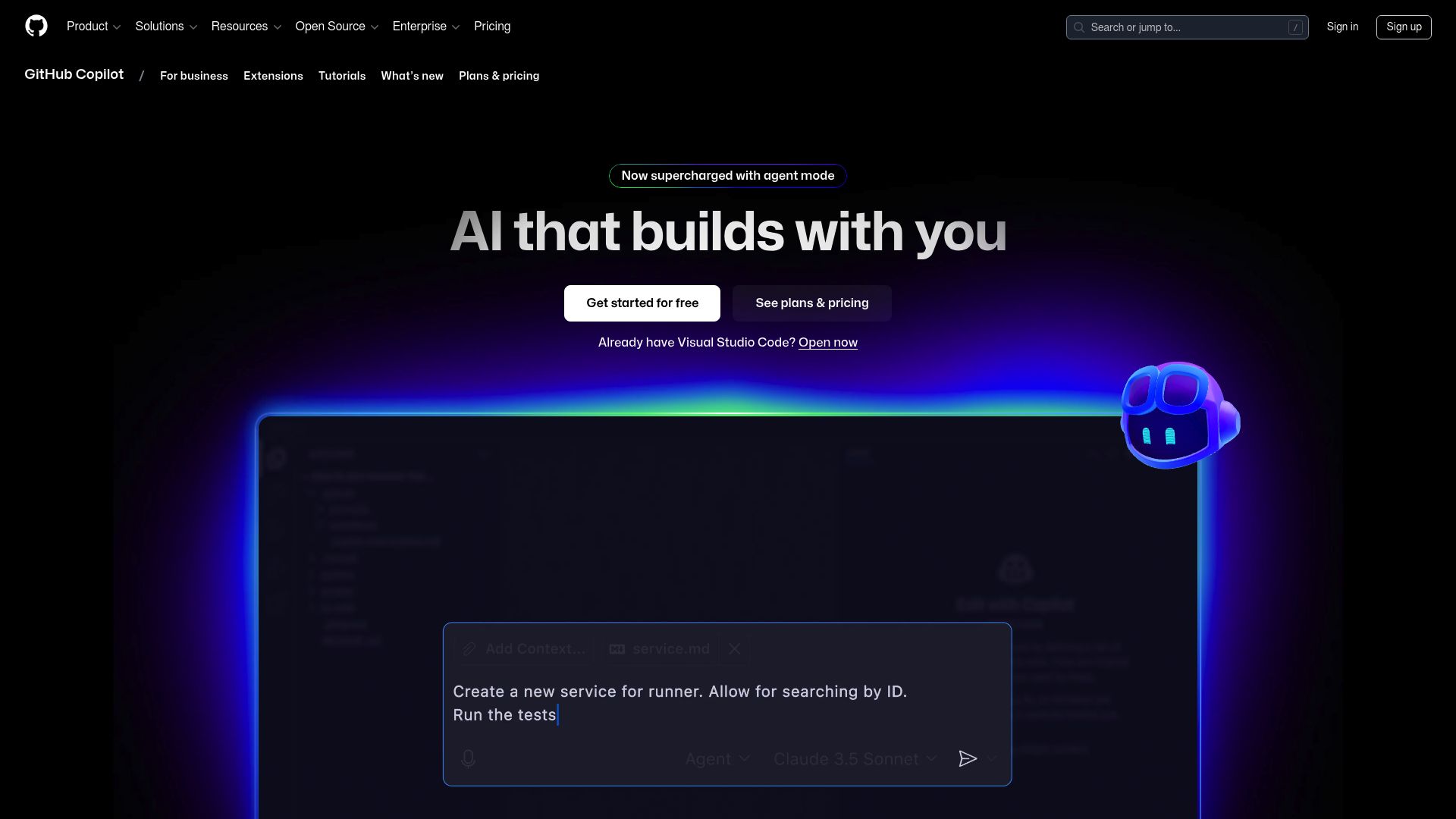
Developers appreciate Copilot’s seamless integration with Visual Studio Code, making onboarding swift and frictionless. Its large training dataset enables high accuracy and frequent updates, ensuring the best ai for coding experience for both individuals and teams. Copilot excels at reducing boilerplate code writing by up to 50%, allowing developers to focus on more complex tasks.
Pros of Copilot:
- Deep integration with the GitHub ecosystem.
- High-quality, contextually relevant code suggestions.
- Frequent enhancements and security patches.
Cons:
- Occasionally suggests irrelevant code.
- Requires an internet connection for full functionality.
For open source contributors and teams, Copilot’s collaborative features streamline coding sessions. According to the 2025 Developer Survey Results, Copilot remains highly trusted among developers seeking the best ai for coding, thanks to its reliability and continuous innovation.
Tabnine
Tabnine is a top contender for enterprises seeking the best AI for coding, offering a free basic plan plus Pro and Enterprise tiers. Its AI-powered code completion supports 20+ languages and major IDEs, with privacy controls and on-premises deployment options.
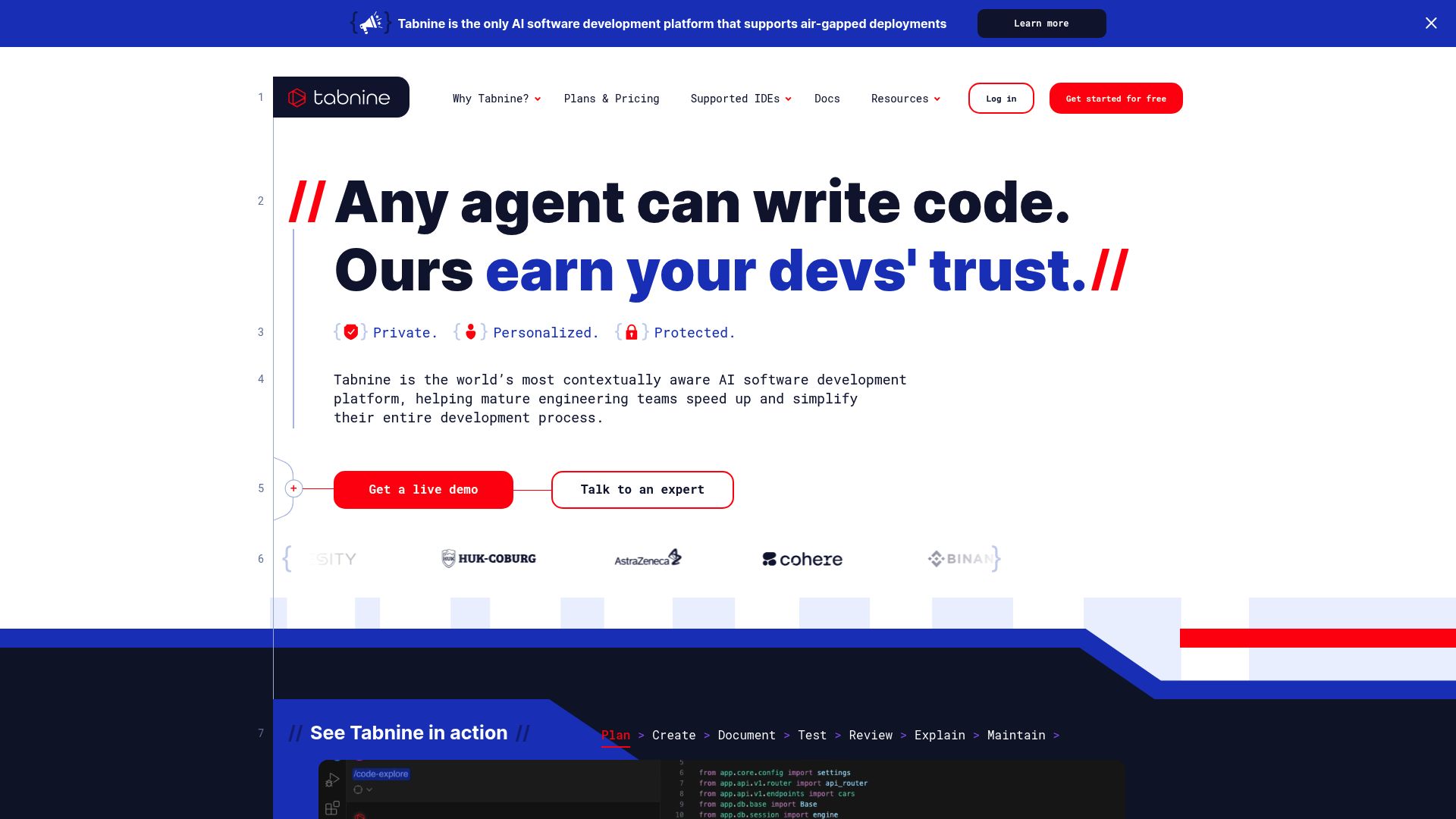
Key features:
- Team knowledge base for shared intelligence.
- Customizable AI models trained on proprietary codebases.
- Strong security focus for regulated industries.
Benefits include enhanced privacy, making Tabnine ideal for privacy-conscious teams. Its customizable nature allows enterprises to fine-tune AI models, ensuring the best ai for coding performance tailored to their unique environments.
Pros:
- Custom model training.
- Robust security and privacy.
- Used by Fortune 500 companies.
Cons:
- Some advanced features require a paid plan.
- Slightly less contextual awareness compared to Copilot.
Tabnine stands out for teams needing secure, scalable, and reliable AI assistance. Its ability to learn from your codebase makes it the best ai for coding for organizations with strict data policies.
Amazon CodeWhisperer
Amazon CodeWhisperer is purpose-built for developers working in the cloud, especially those using AWS. With a free individual tier and a paid professional plan, it offers real-time code recommendations and security scanning integrated directly into popular IDEs.
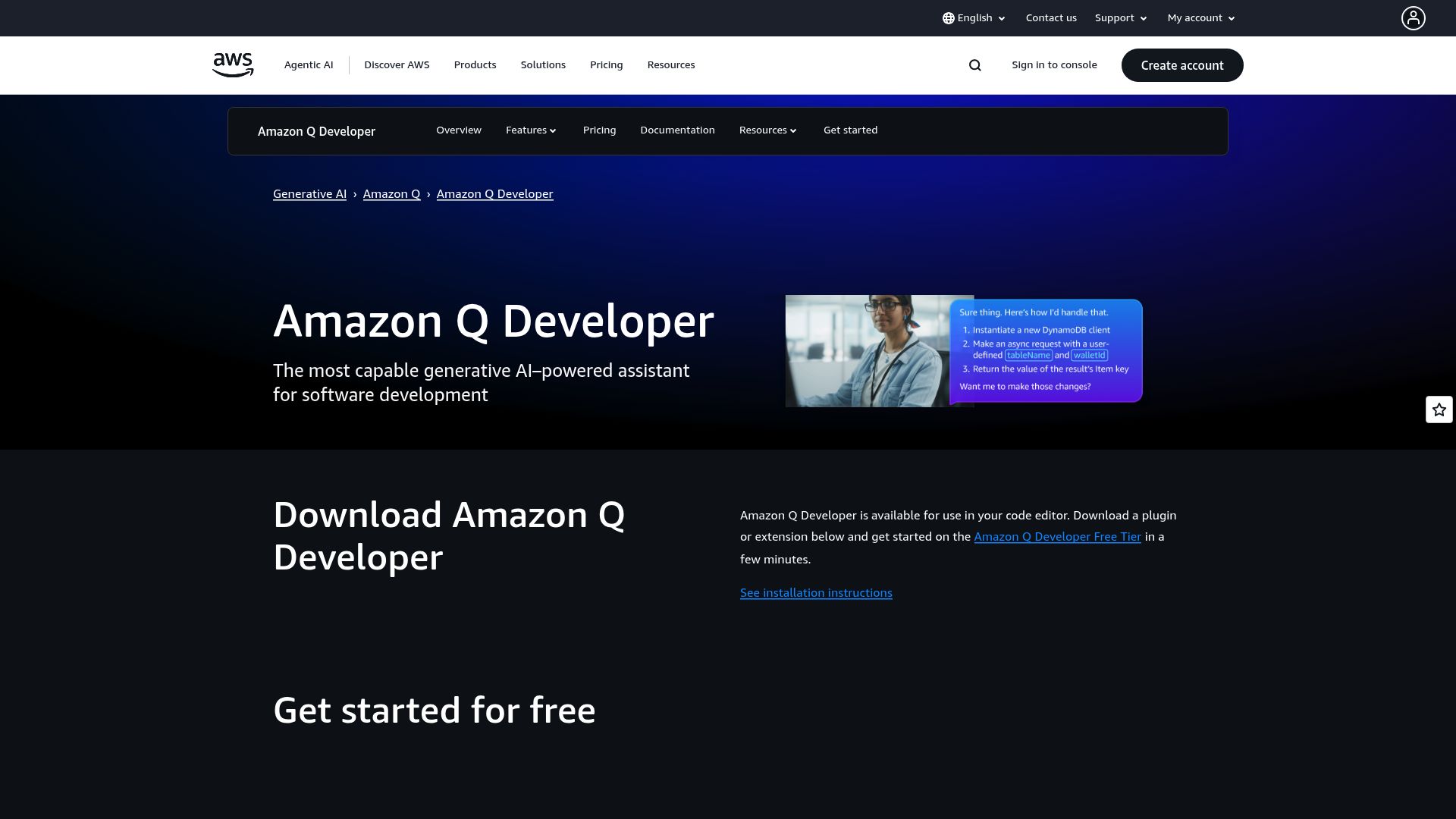
Features include:
- Code suggestions optimized for AWS services.
- Built-in vulnerability detection and compliance scanning.
- Multi-language support.
Cloud developers benefit from CodeWhisperer’s seamless AWS integration, making it the best ai for coding in serverless and microservices environments. The tool accelerates development by identifying potential issues as you write code, streamlining deployment and reducing security risks.
Pros:
- Security-focused recommendations.
- Tight AWS Toolkit integration.
- Real-time compliance checks.
Cons:
- Best suited for AWS-centric workflows.
- Limited offline capabilities.
If your projects revolve around AWS, CodeWhisperer is the best ai for coding, ensuring speed and security without sacrificing flexibility.
Replit Ghostwriter
Replit Ghostwriter, included with Replit Pro subscriptions, is a favorite among learners, educators, and rapid prototyping teams. Its real-time code suggestions, code explanations, and test generation capabilities make it an outstanding choice for those new to coding or working in collaborative, cloud-based environments.
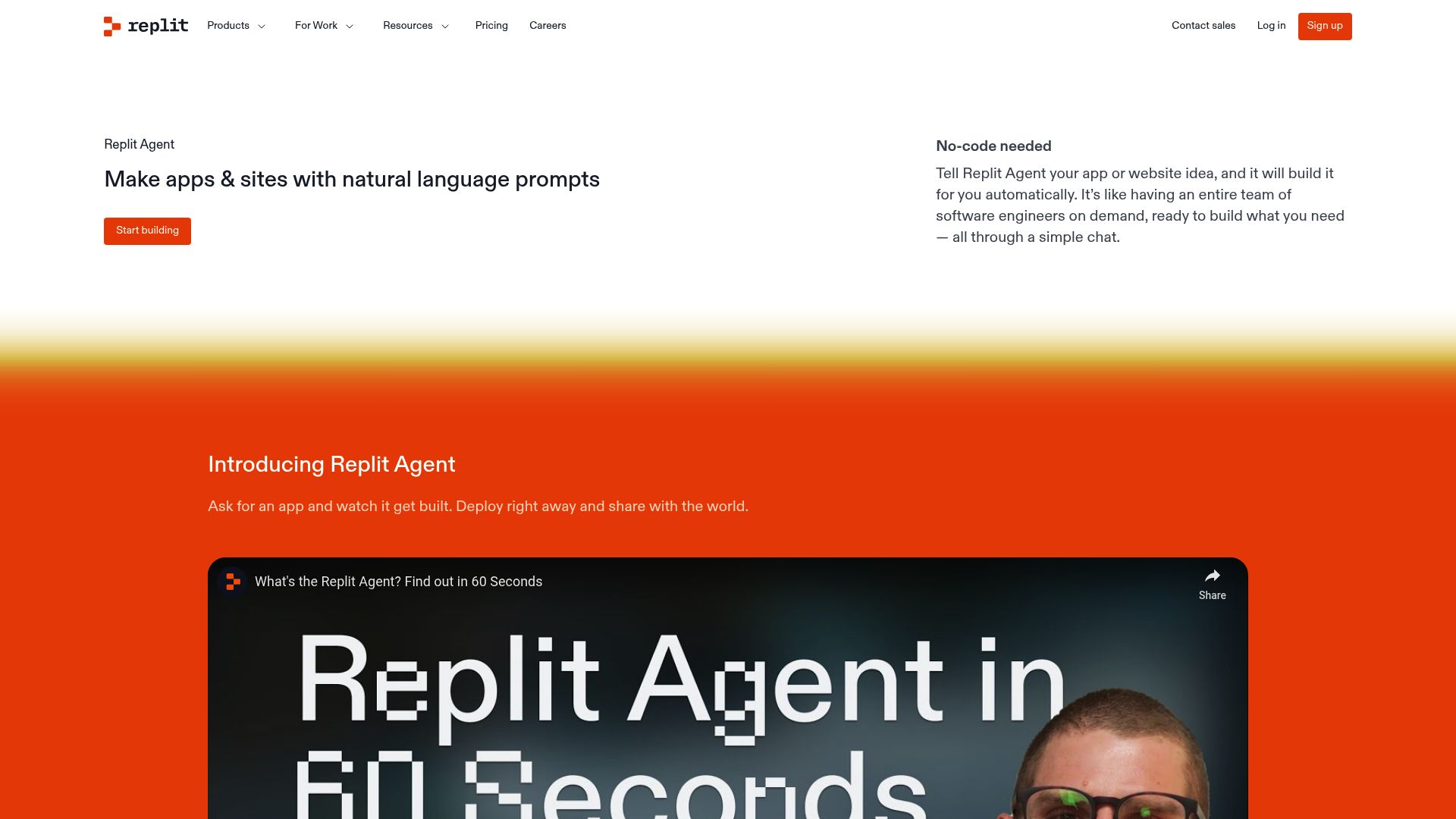
Key features:
- Instantly accessible through Replit’s browser IDE.
- Supports instant deployment and collaborative coding.
- Generates tests and explains code snippets in plain language.
Pros:
- Easy onboarding for beginners.
- Combines AI with collaborative tools.
- Popular with bootcamps and educational programs.
Cons:
- Limited to the Replit environment.
- Fewer enterprise-focused features.
Replit Ghostwriter makes the best ai for coding accessible to everyone, from students to professionals prototyping new ideas. Its unique blend of AI assistance and collaborative coding is unmatched for educational use.
Codeium
Codeium is a free, lightweight tool making waves among freelancers, small teams, and students. With autocomplete, code search, and support for over 70 languages, it’s designed for speed and accessibility.

Core benefits:
- No-cost access for individuals.
- Broad language support and fast response times.
- Easy integration with popular IDEs.
Pros:
- Accessible and fast.
- Great for academic use and small projects.
- Frequent updates and responsive support.
Cons:
- Lacks some advanced features of paid competitors.
- Limited enterprise options.
Codeium stands out as the best ai for coding for those seeking a free, efficient solution. It’s especially useful for students and small teams needing quick, reliable code suggestions without the complexity of enterprise platforms.
Google Gemini Code Assist
Google Gemini Code Assist brings deep cloud-native integration to the best AI for coding landscape. With pay-as-you-go pricing, it’s tailored for enterprise cloud developers and DevOps teams building on Google Cloud.
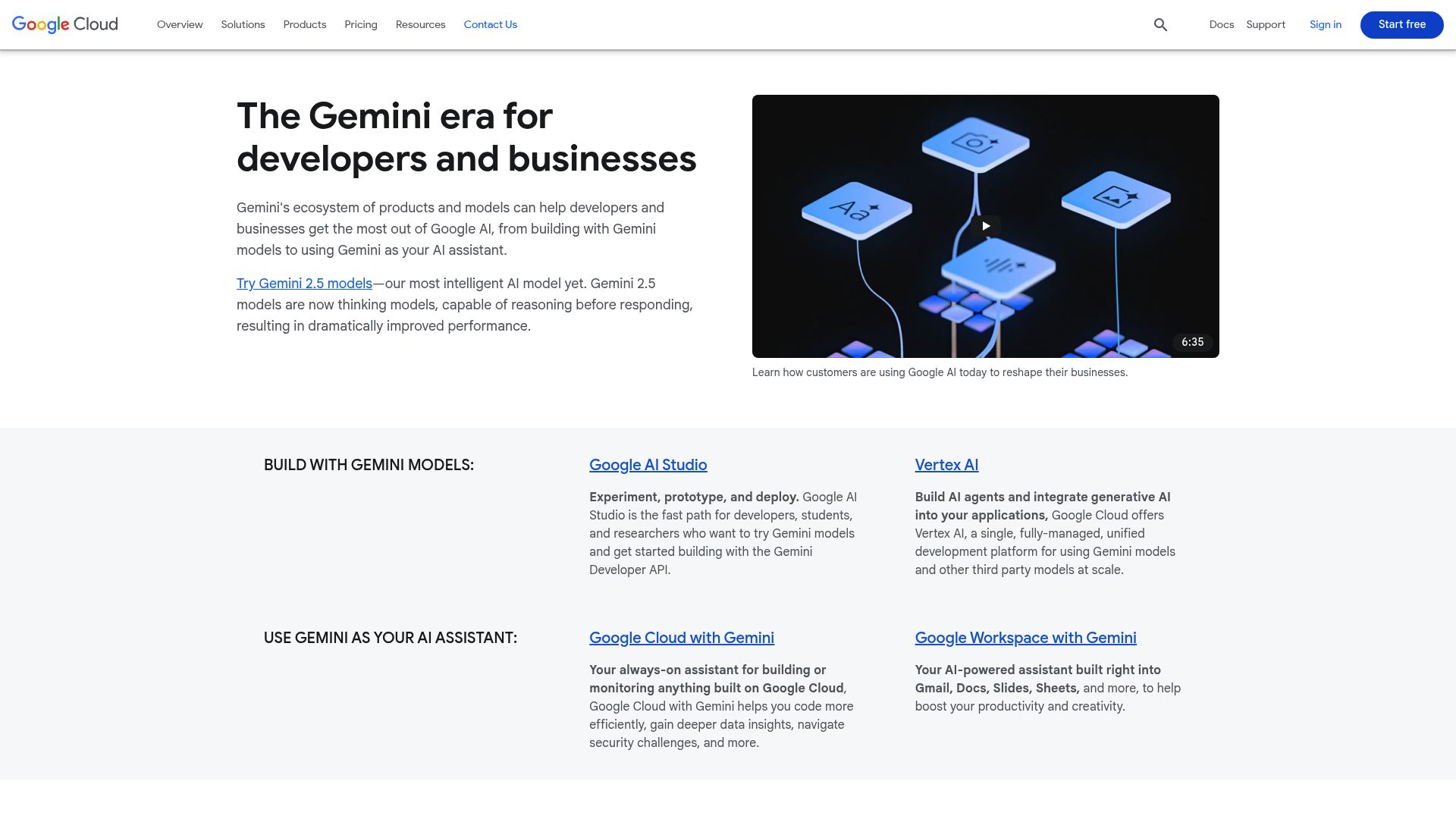
Features:
- Contextual code suggestions powered by Google’s latest AI.
- AI-driven code reviews and cloud app development streamlining.
- Robust security and compliance, leveraging Google Cloud’s infrastructure.
Pros:
- Seamless integration with Google Cloud APIs.
- Strong security and compliance controls.
- Accelerates deployment of scalable microservices.
Cons:
- Requires a Google Cloud account.
- Best suited for cloud-native, large-scale projects.
Gemini Code Assist is the best ai for coding for organizations leveraging Google Cloud, making cloud app development faster, more secure, and more collaborative.
OpenAI Codex
OpenAI Codex powers many of the best AI for coding products, offering API-based pricing and volume discounts for enterprises. Its capabilities range from translating natural language to code, multi-language support, and robust API integration for custom tool development.
Highlights:
- Enables building custom coding assistants and plugins.
- Supports complex workflows and a wide range of languages.
- Highly flexible for startups and advanced developers.
Pros:
- Underlying engine for many AI coding platforms.
- Facilitates plugin and tool development.
- Scalable for enterprise use.
Cons:
- Requires API integration knowledge.
- Usage costs can increase with scale.
OpenAI Codex is the best ai for coding for teams needing to build custom solutions, power internal tools, or support unique workflows beyond off-the-shelf options.
Comparison Table: Top 7 Best AI for Coding Tools in 2025
| Tool | Pricing | Key Features | Best For | Unique Strength |
|---|---|---|---|---|
| GitHub Copilot | Subscription | Autocomplete, GitHub integration | Teams, OSS Contributors | GitHub ecosystem |
| Tabnine | Free/Paid | Custom AI, privacy controls | Enterprises, secure teams | On-premises training |
| Amazon CodeWhisperer | Free/Paid | AWS integration, security scan | Cloud, AWS developers | Compliance scanning |
| Replit Ghostwriter | Pro Subscription | In-browser, test generation | Learners, educators | Collaborative coding |
| Codeium | Free/Team | Fast, 70+ languages | Students, freelancers | Accessibility |
| Google Gemini Code Assist | Pay-as-you-go | Cloud-native, code reviews | Enterprise, DevOps | Google Cloud synergy |
| OpenAI Codex | API-based | NL2Code, API, plugins | Startups, tool builders | Customization power |
Each tool brings a unique approach to the best ai for coding, allowing you to match your needs with the right technology for your workflow.
How to Choose the Right AI Coding Tool for Your Needs
Selecting the best ai for coding is more than just picking a popular name. The right tool can transform your development process, but the wrong fit may slow you down. Let's break down how to evaluate your options and make an informed choice.
Assessing Your Workflow and Tech Stack
Start by mapping your current development environment. Does your workflow rely on a specific IDE or language? The best ai for coding will seamlessly integrate with your preferred tools.
- Check if the tool supports your main programming languages.
- Confirm compatibility with your IDE (e.g., VS Code, IntelliJ).
- Look for plugins or extensions that simplify integration.
If you use cloud platforms, see if the AI assistant aligns with your deployment stack. A mismatch here can introduce friction, so prioritize tools that fit naturally into your daily routine.
Evaluating Security and Privacy Considerations
Security is crucial when evaluating the best ai for coding, especially for teams handling sensitive or proprietary code. Investigate whether the tool offers on-premises deployment or strong privacy controls.
Ask these questions:
- Is your code processed locally or sent to the cloud?
- What data retention and sharing policies does the vendor follow?
- Are there options to train the AI on your private codebase?
For regulated industries or confidential projects, choose a solution that puts privacy first. This ensures your intellectual property stays protected.
Balancing Cost and Value
Comparing the cost-to-value ratio is essential when choosing the best ai for coding. Free tiers are great for individuals, but teams may need advanced features found in paid plans.
| Plan Type | Features | Best For |
|---|---|---|
| Free | Basic completion | Students, hobbyists |
| Pro/Enterprise | Team collaboration, security, custom models | Businesses, large teams |
Factor in the return on investment. Will the tool save enough time or reduce errors to justify the expense? Make sure the benefits align with your team's goals and budget.
Community, Support, and Documentation
A vibrant community and solid support can make a big difference with the best ai for coding. Active forums and user groups help you solve problems quickly, while responsive support ensures you’re never left stranded.
Before committing, check:
- Are there regular updates and bug fixes?
- Is documentation comprehensive and easy to follow?
- Do other developers share positive experiences? Insights from studies like the Usability of AI Programming Assistants reveal common successes and challenges.
Choosing a tool with strong community backing ensures you’ll always have resources at your fingertips.
The Future of AI in Coding: What to Expect Beyond 2025
As we look beyond 2025, the landscape of the best ai for coding is set to transform in ways that will redefine how developers interact with code. Let’s explore the innovations, evolving roles, ethical challenges, and industry insights shaping the next era.
Emerging Technologies and Innovations
The best ai for coding is rapidly evolving, with generative AI models growing more sophisticated each year. Future AI tools will not just complete code—they'll architect entire modules, refactor legacy systems, and even suggest optimal design patterns based on project context.
One major breakthrough will be the integration of AR and VR into coding environments. Imagine donning a headset and manipulating code blocks in three dimensions, or collaborating with remote teammates in a shared virtual workspace. This immersive approach could make debugging and architectural planning more interactive and intuitive.
As these innovations roll out, expect the best ai for coding to become more deeply embedded in the daily workflow, shifting how developers think about building software.
Impact on Developer Roles and Skills
With smarter tools, developers’ roles will pivot toward higher-level problem-solving. Instead of focusing on repetitive tasks, professionals will leverage the best ai for coding to automate boilerplate and routine functions.
This evolution means AI literacy will become as essential as knowing a programming language. Developers will need to understand how to guide, evaluate, and collaborate with AI assistants. Upskilling in prompt engineering, model fine-tuning, and ethical AI use will be in high demand.
Ultimately, the best ai for coding will empower teams to innovate faster, making creativity and critical thinking the most valuable tools in a developer’s kit.
Ethical and Regulatory Considerations
As the best ai for coding becomes more prevalent, ethical concerns will grow. Bias in AI-generated code can introduce subtle issues, from security vulnerabilities to unfair algorithms. Developers and companies must be vigilant about evaluating outputs for unintended consequences.
Regulation is on the horizon. Governments and industry groups are working to establish guidelines for transparency, accountability, and data privacy. Staying ahead of these changes will be critical for organizations adopting the best ai for coding, ensuring compliance and trust in automated solutions.
Predictions and Industry Insights
Expert forecasts suggest explosive growth in the best ai for coding market over the next decade. According to the AI in Software Development Market Report, global investment in AI-powered coding tools is projected to surpass $25 billion by 2030, fueled by demand for low-code and no-code platforms.
Startups and tech giants alike are racing to develop specialized AI assistants. We’re likely to see new entrants focusing on niche languages, industry-specific workflows, and even open-source AI models tailored to unique business needs.
In summary, the best ai for coding will continue to push boundaries, opening new possibilities for developers everywhere.
Now that you’ve seen how AI coding tools are changing the game in 2025, you might be wondering how you can turn this tech edge into something bigger—like building your own digital product business. At CreateSell, we’re all about helping you move from trading your time for money to creating scalable, self-sustaining products. Whether you’re just starting out or ready to level up, you’ll find step-by-step guidance, expert insights, and real-world strategies to help you grow. Ready to begin your journey and put these AI tools to work for you? Get Started